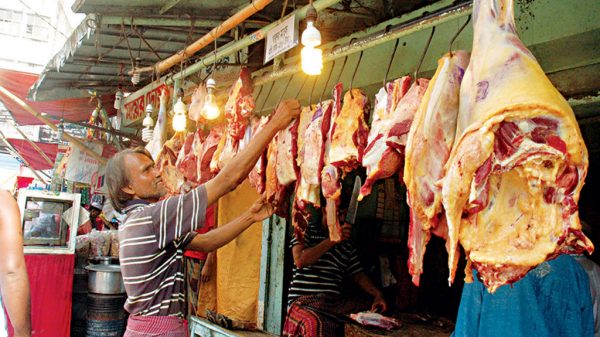Eroding purchasing capacity: Low animal protein intake poses health risks

Shawdesh Desk:
Intake of animal proteins has fallen significantly in recent times across the country, posing severe public health risks particularly for the poor and vulnerable groups of people.
The Centre for Policy Dialogue has recently said that the prices of basic food items have gone beyond the reach of ordinary people in recent months because of high inflation that was hardly reflected in the official data.
The local think tank also said that many working class people could not even afford a ‘compromised diet’ with their low wages let alone protein-rich diet like fish, beef, mutton and chicken.
Department of Livestock Services statistics showed that meat production in Bangladesh dropped to 6.02 lakh tonnes in October from 12.25 lakh tonnes in July, indicating a fall in the consumption.
Nutritionists observed that animal proteins are high quality proteins that play a vital role in the human body metabolism and a significant role in child’s growth — mental and physical.
Dhaka University Institute of Nutrition and Food Science professor Nazma Shaheen said that animal-sourced foods are excellent sources of high-quality proteins and bioavailable micronutrients that can be difficult or impossible to obtain from plant-sourced foods.
The ASFs are particularly important for individuals with high nutrient requirements, such as young children, and pregnant and lactating women.
Animal-sourced foods are particularly rich sources of six nutrients — vitamin A, vitamin B12, riboflavin (also called vitamin B2), calcium, iron and zinc.
According to experts, the six micronutrients play a critical role in the growth and development of children.
Relatively small amounts of these foods, added to a vegetarian diet, can substantially increase nutrient adequacy.
The ASFs are rich in bioavailable nutrients, including calcium, iron, zinc, vitamin B12, vitamin D, choline, DHA and EPA.
Deficiencies of these micronutrients, either resulting from inadequate intake or poor absorption, are responsible for poor growth, anaemia (iron deficiency anaemia and macrocytic anaemia), rickets, night blindness, impaired cognitive functioning, neuromuscular deficits, diminished work capacity, psychiatric disorders and death.
Some of these effects, such as impaired cognitive development from an iron deficiency, are irreversible, they added.
Micronutrient deficiency is associated with poor early cognitive development, stunting, iron deficiency anaemia and impaired cognitive ability that lead to physical and cognitive impairment, among others.
Dhaka University’s Institute of Health Economics professor Syed Abdul Hamid said that the human body was a machine which needed various types of food, including macro and micro nutrients those come from different sources, including animal protein.
When someone is compelled to cut protein consumption, the body function changes that hampers regular tasks, he said.
As protein is a high-value food item, when the people face any economic hardship, they cut protein consumption as the easiest way to deal with the situation.
‘Poverty is a vicious circle, when one deducts food budget; it reduces his or her productivity and exposes the person to diseases that again puts them in deeper poverty,’ said Hamid.
He said that the circle even could push people to the poorest level.
According to a study released in December that the erosion of purchasing power caused by high inflation between 2022 and 2024 significantly deepened poverty and vulnerability, driving an additional 1.78 crore people in the country into poverty or at risk of poverty.
It said that the moderate poverty saw a sharp increase, climbing from 18.22 per cent to 22.95 per cent leading 78.6 lakh people below the poverty line between 2022 and 2024.
The study titled ‘Current Macroeconomic Situation and Preparation for LDC Graduation’ conducted by the Research and Policy Integration for Development found that the proportion of people living in extreme poverty rose from 5.65 per cent in 2022 to 7.95 per cent in 2024.
Institute of Nutrition and Food Science professor Kazi Muhammad Rezaul Karim said that some animal proteins cannot be obtained from alternative sources and deficiencies of those proteins disrupt body functions.
Nutrition expert Nizamul Hoque Bhuiyan said that cheap-priced fishes like carps, pangus and tilapia could be easy sources, but more hazardous in terms of the feed these fishes were given.
The upward trend in inflation continued as it went up further to 11.38 per cent in November on the back of price hikes of food items in both rural and urban areas.
The food inflation was recorded at 14.63 per cent in the urban area and 13.41 per cent in the rural area in the month, showed Bangladesh Bureau of Statistics data.
In October, the rate of general inflation was 10.87 per cent, which is already 14-year high as the average inflation was recorded at 10.92 in FY11.
The inflation in November hit 16-year high as the average inflation in FY08 was recorded at 12.30 per cent.























Leave a Reply